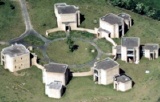Workshop on Set Theory
Programme:
Thursday 30 May 2013
(Lectures in B3.03)
13:00 Adam Epstein (Warwick) "Axioms of Infinity in Zermelo Set Theory"
Abstract: Without using Replacement, one cannot infer the existence of a definite infinite set from the existence of an otherwise unspecified infinite set. We prove this by considering various bizarre models of the system of set theory which we develop in MA3H3.
14:00 Philip Welch (Bristol) "Introduction to ZFC + Strong Axioms of Infinity"
Abstract: Set theorists from 1900 onwards have sought to strengthen the principles underlying our study of sets. This has evolved into a sophisticated view of the of the cumulative hierarchy of sets, V, together with its possible embedding properties.
15:00 Tea
16:00 Thomas Forster (Cambridge) "Introduction to New Foundations"
Abstract: A brief, general backgrounder to NF will be given. Proofs only in outline, the aim being to convey a sense of what the theory is doing, what its provenance is, and what it means.
17:00 Zachiri McKenzie (Cambridge) "Constructing Models of NFU"
Abstract: I will start by giving a brief introduction to the set theory NFU introduced by Ronald Jensen. This theory is obtained from Quine's NF by weakening the extensionality axiom to allow objects that are not sets into the domain of discourse. I will present a simplified version of Ronald Jensen's argument showing that models of NFU can be built inside models of ZFC. I will finish by discussing what these models of NFU look like and how the assumption that ZFC is consistent can be weakened in this construction.
Friday, 31 May 2013
11:30 Lunch
(Lectures in B3.03)
12:30 Richard Kaye (Birmingham) "Witnessing principles in set theory and arithmetic"
Abstract: We look at witnessing principles in second order arithmetic based on Kalmar elementary functions with Delta^0_1 comprehension and induction but not necessarily Sigma^0_1 induction. Such base systems are weaker than RCA0. The general witnessing principles MW1 and MW2 found relate to convergence and the Cauchy property of convergent sequences of rationals. We showethat over this base theory Sigma^0_1 induction + MW1 is equivalent to ACA0, but the Q: MW1 => MW2? is apparently quite hard and interesting.
13:30 Philip Welch (Bristol) "Introduction to Determinacy"
Abstract: Early work by Polish set theorists and analysts indicated that the existence of winning strategies of two person perfect information games on Baire or Cantor space had interesting consequences for how we view those spaces: determined classes of sets are Lebesgue measurable, have the Baire property and if uncountable have a perfect subset, and thus have size the continuum. We introduce some of the ideas, but pay attention to the connections with large cardinals and strong axioms of infinity.
14:30 Thomas Forster (Cambridge) "Stratification and Synonymy"
Abstract: This will be a talk in general terms about the significance of the notion of stratification for the project of reconstructing mathematics inside set theory, with particular reference to set theories with a universal set,
such as Church's. Church's construction lends itself to synonymy arguments to the effect that these theories are just ZF-like theories in Wolf's clothing. Some useful techniques and ideas will be presented, but very few
theorems: this will be an ideas talk not a new-results talk.
15:30 Tea
Colloquium Lecture in B3.02
16:00 Philip Welch (Bristol) "Turing Unbound: black holes, computers, neural nets, bangs, shrieks, transfinite ordinals, and the kitchen sink"
Abstract: There has been much talk (some of it rather loose) in the last few years concerning the possibility of "hypercomputation". This can start out from discussions as to whether Turing's machine model is appropriate for "modern" computation, or from claims that we can - perhaps only theoretically - compute "beyond the Turing limit", that is somehow fix up a device that enables us to 'compute' the Turing halting problem. On closer inspection most of such devices are seen to be formally cheating in some way or other, usually by assuming infinite precision measurement of some kind. We look at the mathematics of one model that at least is not cheating in that sense: these are computations in Malament-Hogarth spacetimes. We investigate as a purely logical exercise the limits of computation in such manifolds.
See also:
Mathematics Research Centre
Mathematical Interdisciplinary Research at Warwick (MIR@W)
Past Events
Past Symposia
Where possible, visitors should obtain an EDUROAM account from their own university to enable internet access whilst at Warwick.
You can register for any of the symposia or workshops online. To see which registrations are currently open and to submit a registration, please click hereLink opens in a new window.
Mathematics Research Centre
Zeeman Building
University of Warwick
Coventry CV4 7AL - UK
E-mail:
MRC@warwick.ac.uk

